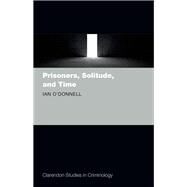Prisoners, Solitude, and Time
, by O'Donnell, Ian- ISBN: 9780199684489 | 0199684480
- Cover: Hardcover
- Copyright: 12/30/2014
Examining two overlapping aspects of the prison experience that, despite their central importance, have not attracted the scholarly attention they deserve, this book assesses both the degree to which prisoners can withstand the rigors of solitude and how they experience the passing of time. In particular, it looks at how they deal with the potentially overwhelming prospect of a long, or even indefinite, period behind bars.
While the deleterious effects of penal isolation are well known, little systematic attention has been given to the factors associated with surviving, and even triumphing over, prolonged exposure to solitary confinement. Through a re-examination of the roles of silence and separation in penal policy, and by contrasting the prisoner experience with that of individuals who have sought out institutional solitariness (for example as members of certain religious orders), and others who have found themselves held in solitary confinement although they committed no crime (such as hostages and some political prisoners), Prisoners, Solitude, and Time seeks to assess the impact of long-term isolation and the rationality of such treatment. In doing so, it aims to stimulate interest in a somewhat neglected aspect of the prisoner's psychological world, including how to prepare them for the harshness of solitary confinement, as well as risk assessments for potential suicides and other issues.
Using data gathered over 18 months from a variety of sources, including visits to prisons such as Pentonville in London, Mountjoy in Dublin, and Eastern State Penitentiary in Philadelphia, as well as correspondence with a selection of prisoners and hermits, the author balances these direct, positive experiences with newspaper reports, tracts written by prison chaplains and reformers, official publications, and documents produced by commissions of inquiry, weaving together these diverse strands to present a more complete picture of solitude and its effects.
While the deleterious effects of penal isolation are well known, little systematic attention has been given to the factors associated with surviving, and even triumphing over, prolonged exposure to solitary confinement. Through a re-examination of the roles of silence and separation in penal policy, and by contrasting the prisoner experience with that of individuals who have sought out institutional solitariness (for example as members of certain religious orders), and others who have found themselves held in solitary confinement although they committed no crime (such as hostages and some political prisoners), Prisoners, Solitude, and Time seeks to assess the impact of long-term isolation and the rationality of such treatment. In doing so, it aims to stimulate interest in a somewhat neglected aspect of the prisoner's psychological world, including how to prepare them for the harshness of solitary confinement, as well as risk assessments for potential suicides and other issues.
Using data gathered over 18 months from a variety of sources, including visits to prisons such as Pentonville in London, Mountjoy in Dublin, and Eastern State Penitentiary in Philadelphia, as well as correspondence with a selection of prisoners and hermits, the author balances these direct, positive experiences with newspaper reports, tracts written by prison chaplains and reformers, official publications, and documents produced by commissions of inquiry, weaving together these diverse strands to present a more complete picture of solitude and its effects.






